Books From Bob’s Library is a semi-regular series in which freethought book collector and National Secular Society historian Bob Forder delves into his extensive collection and shares stories and photos with readers of the Freethinker. You can find Bob’s introduction to and first instalment in the series here and other instalments here.
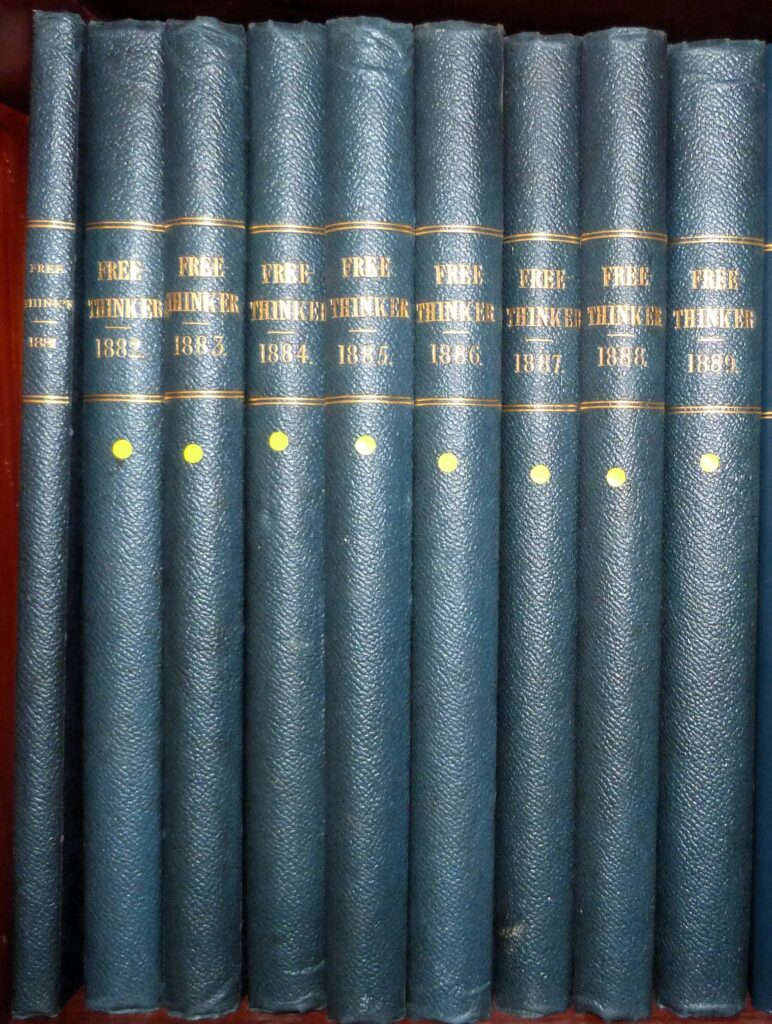
For the past three years, GW Foote & Co. Ltd have been working on a project to digitise the complete run of print versions of the Freethinker from 1881 to 2014. This project has now been completed and everyone can access this extraordinary back catalogue free of charge here.
In the first instalment of this series, I explained my own interest in freethought literature and my continuing career as a part-time bookseller for over 40 years. I have had the privilege of handling thousands of freethought books, pamphlets, journals, and other ephemera. However, the occasions when I have come across past issues of the Freethinker have been remarkably few. I have handled early bound volumes just twice and even later examples are rare, with dealers often demanding prices best described as speculative. I have asked myself why this is and guess that the attitude to newspapers is generally that you read them and then throw them away.
What is more, the printed Freethinker was always published in a relatively large format—the first copies were foolscap size (approximately 34 x 20 cm). This lasted for many years and made them difficult to store. The copies I have come across have almost always been bound volumes sold at the end of the calendar year. There were two types of these, one leather bound and one bound in sturdy green cloth. The former did not age well, with the leather cracking and the boards detaching, but the latter stood the test of time. I am delighted to say that one of the two sets I have handled still adorns my bookshelves and continues to provide me with hours of instruction, distraction, and entertainment.
If you agree that the Freethinker has been the dominant voice of British secularism and freethought for 143 years, and that secularism and freethought are central to a free and democratic society, then the Freethinker is precious, and it is troubling that up to now the archive has been so difficult to access. For most, it has meant an arduous physical visit to a copyright library. This is why the conclusion of the GW Foote & Co. digitisation project is cause for cheers and celebration.
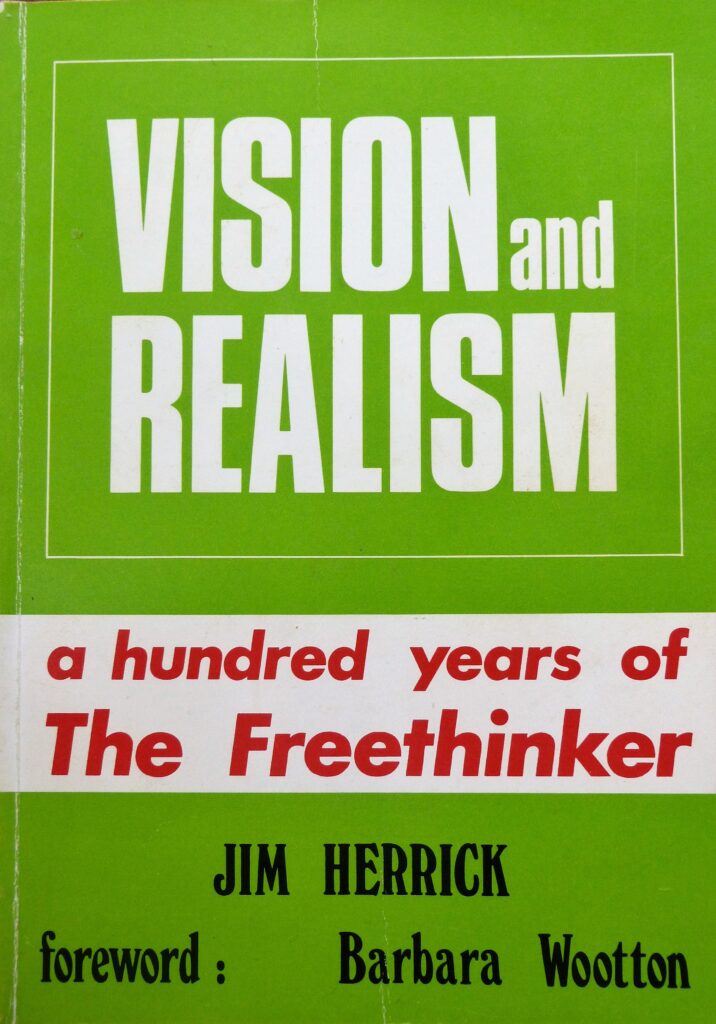
As a tentative pointer to what readers might enjoy about the archive, I offer the following comments on the Freethinker’s history and an indication of what I have discovered over the years in my own printed collection.
In a previous article, I wrote of George Willam Foote’s (1850-1915) early life, his founding of the Freethinker in 1881, and his year-long imprisonment for blasphemy. An additional matter that deserves recognition is that Foote’s actions involved a large element of self-sacrifice. He was a cultivated, bookish man, a librarian with refined literary tastes who wrote beautifully. For him, the abrasive, satirical, and outrageous style of the new journal was initially alien. However, he was so incensed by the treatment of the President of the National Secular Society (NSS), Charles Bradlaugh, and the deprivation of Bradlaugh’s right to sit as an MP for Northampton, that he determined to take the fight to the ‘bigots’.
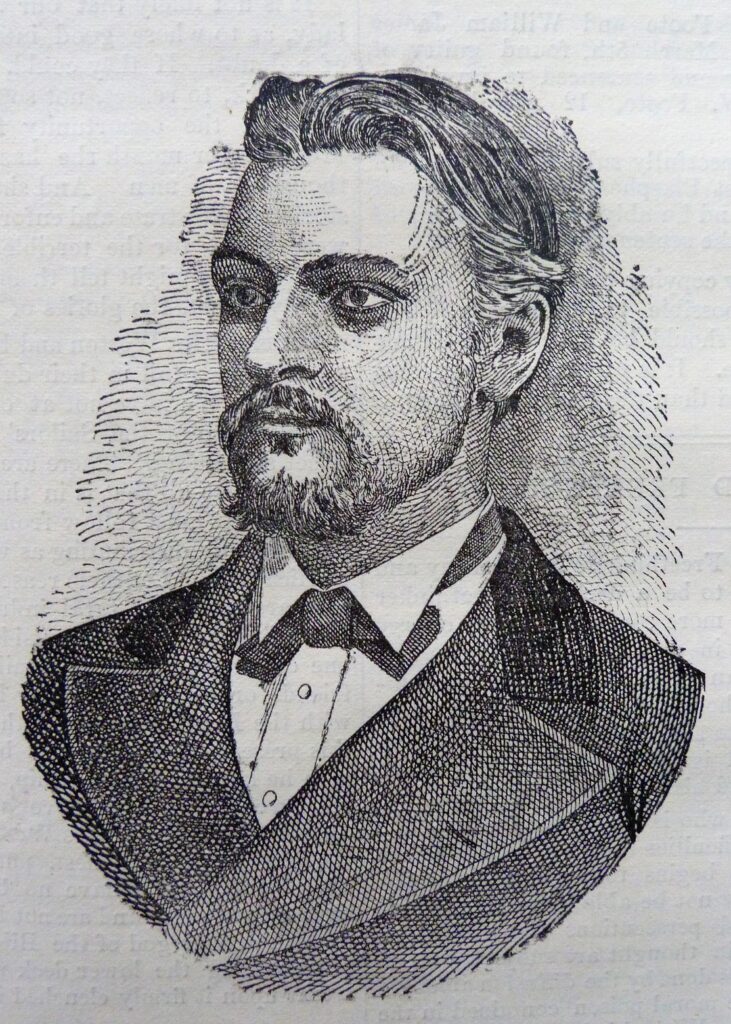
He was also influenced by the established tone of freethought publications, epitomised by George Jacob Holyoake’s (1817-1906) writings which were thoughtful, worthy, totally lacking in humour, and, for many, rather boring. Foote reasoned that humour was a devastating weapon when employed against pompous authority figures in the established church and against religion in general. He reasoned that nobody takes seriously an individual or idea that has been laughed at and he also noted the satirical power of cartoons, which he was to employ with great effect and which led to his conviction for blasphemy. Some things never change; cartoons have not lost their power to provoke in the modern world.
Foote’s years as editor were not only characterised by his pungent attacks on the religious and religion. After his accession to the NSS Presidency in 1890, the Freethinker emerged as the NSS’s ‘in-house’ journal, acting as a type of noticeboard providing details of lectures, meetings, and publications. I particularly enjoy Joseph Mazzini Wheeler’s tightly written historical and biographical articles. Here was a man who grasped the significance of the intellectual and historical traditions of freethought. It is a great pity that his poor health and early death scuppered his plans to write a history of those traditions.
By the beginning of the First World War, Foote was ailing. Although he nominally remained editor, he had relocated to Westcliff-on-Sea for the sea air and occasionally commuted into London. Much of the actual editorial work and writing was being carried on by his sub-editor and loyal deputy, Chapman Cohen (1868-1954). Cohen formally took over the editor’s position and became President of the NSS when Foote died in 1915. He was known to a generation as CC, remaining editor until 1951. The Freethinker had had just two editors in its first 70 years.
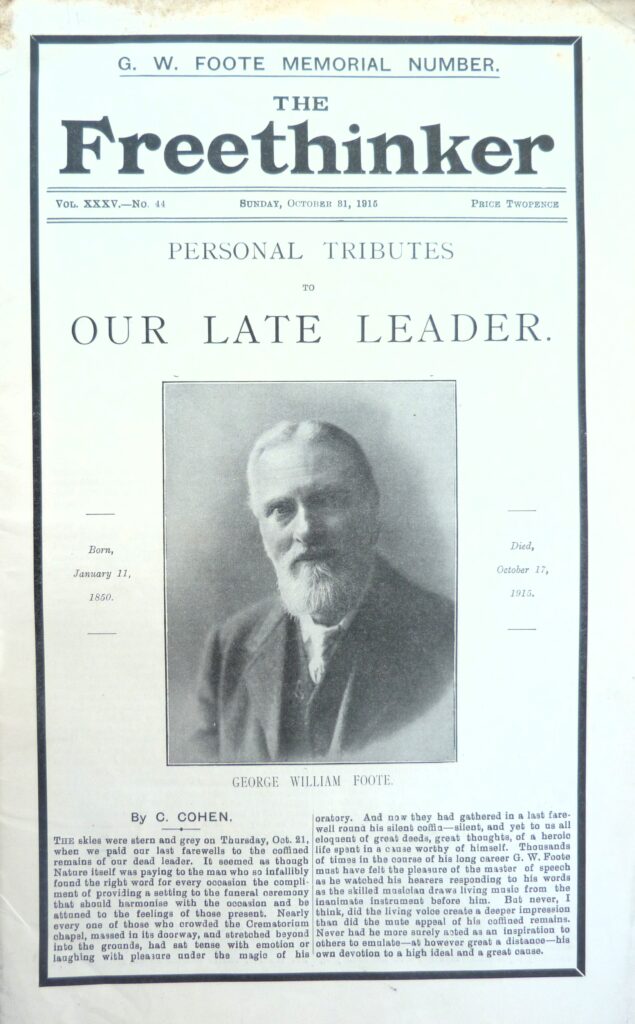
Like Foote, Cohen came to dominate the journal and make it his own, but there were differences in approach, substance, and style. By the time of Cohen’s accession, the days when freethought was associated with radical political campaigns and working-class activism were long past. CC had little or no contact with politicians and always resisted political interventions in his many public meetings. His writings were characterised by a relatively sober critique of the illogicality, contradictions, and self-serving nature of religion and the religious. His arguments were rooted in philosophy, natural and social science, and literature. Foote’s biting satire was no more, and the cartoons long forgotten.
To my mind, Cohen’s greatest attribute was his ability to make the logical case for freethought in terms accessible to general readers. He never talked down, he just wrote logically and clearly in elegant, plain English that all could understand. Forty years ago, when I started book dealing, there were a few older customers who knew him. More than once I heard him described as ‘my greatest teacher’. To this, I would add that there was not a freethinking argument advanced by Bertrand Russell that CC had not made before. This is not to belittle Russell; rather, it is to recognise Cohen. For those who want to understand the case for atheism and the dangers of religion, just go to the Cohen years in the archive.
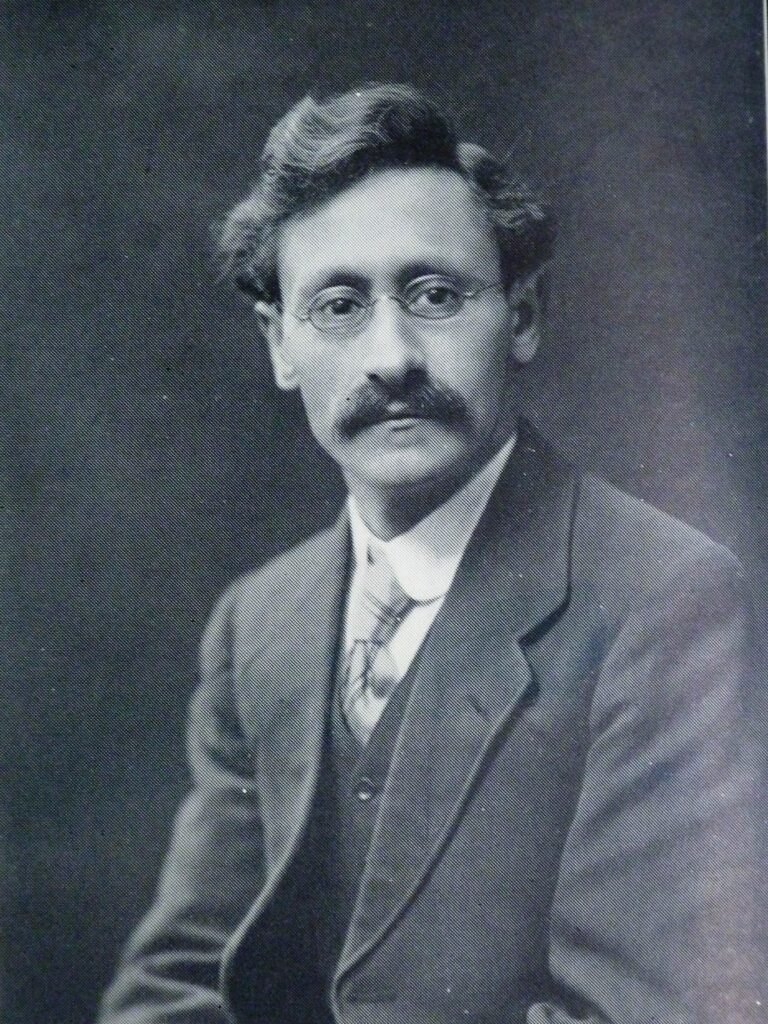
Before moving on, I must recognise CC’s sheer hard work. Each week through the 1920s and 30s he edited 12 or 16 foolscap pages, some of which he wrote. He corresponded with readers, provided the NSS with leadership, and spent his weekends speaking publicly. In the summer, that meant ‘outdoors’, in parks and public spaces. From September to April, he was ‘indoors’, travelling the country giving lectures (sometimes three in a single weekend). For example, during the 1919-1920 indoor season he spoke at no less than 34 venues on more than 50 occasions. This was a pattern and level of activity that he maintained throughout the interwar years.
One contributor whose writings will be enjoyed by those with an interest in freethought and radical history is Herbert Cutner (1881-1969), although he did not restrict himself to historical subjects. He began his contributions in 1920 and by 1959 had had his 1,000th article published.
Since Cohen’s resignation the turnover of editors has been more rapid, at times too rapid, although an important exception was Barry Duke’s 24-year tenure beginning in 1998. One editor who had a particular impact on me was Bill McIlroy (1928-2013), who served three separate terms totalling more than 14 years. As well as commissioning some important historical essays, and networking with individuals such as politicians Tony Benn and Michael Foot and academics Edward Royle and David Berman, Bill had a talent for punchy, witty headlines. Here are some examples to whet the appetite. ‘Pious Indoctrinators Tighten Grip on Classroom Captives’ (July 1988); ‘Embryology Bill: “Pro-Life” Dirty Tricks Campaign Aborted’ (May 1990); ‘Patten Links Crime Rate with Decline in Fear of Fire and Brimstone’ (May 1992).
Another relatively recent contributor who should be mentioned is Jim Herrick (1943-2023), a stalwart of the freethought and secularist movement in general, editor of the Freethinker from 1977 to 1981, and contributor on a diverse range of subjects over many years. I have particularly enjoyed Jim’s theatre reviews and historical articles. An invaluable contribution is his centenary history of the journal, Vision and Realism: A Hundred Years of the Freethinker, published in 1982.
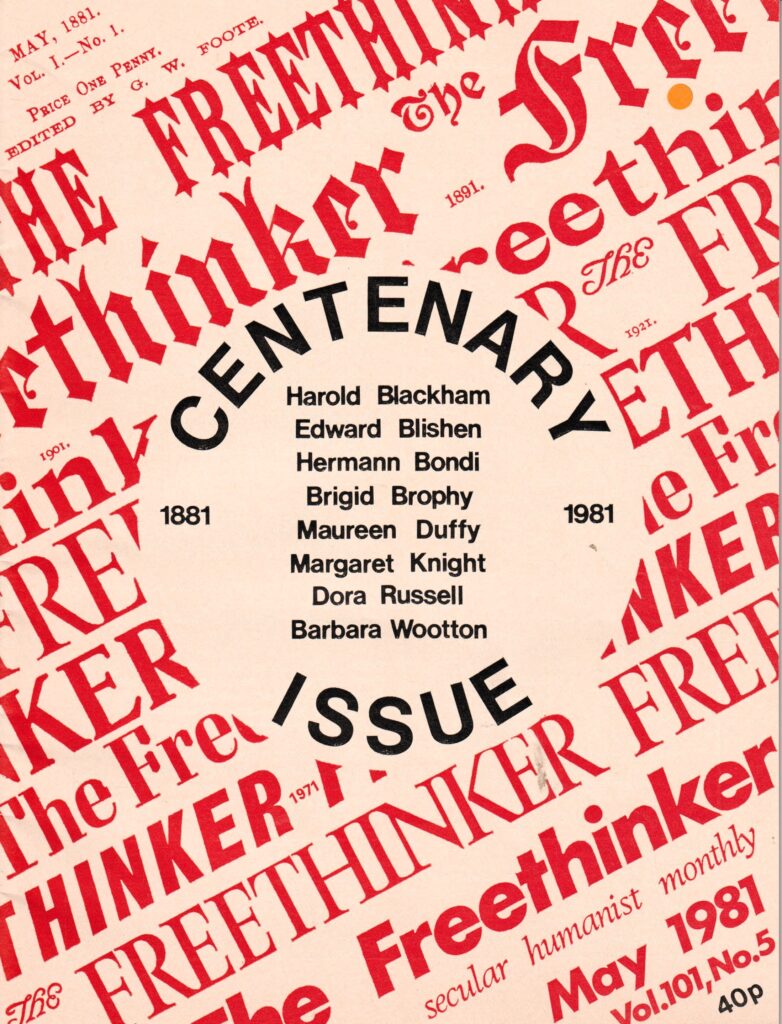
So, the Freethinker lives on as a contemporary digital magazine rooted in its historical archive. Not everything published in its pages over the past 143 years has been impressive, although much of it is. But for me, it is a kind of intellectual treasure trove hidden away for too long and unavailable to even its most fervent supporters. There is nothing quite like it, with its alternative and critical take on religious belief, contemporary events, and social developments. It is also a testament to those who have gone before and who have on occasion sacrificed their own interests rather than surrender their intellectual freedom. The digital archive will be invaluable in keeping this intellectual tradition, once termed ‘the best of causes’, alive for a long time to come.
Editor: The Freethinker digital archive is a great achievement, the work of many hands. Though it, like the Freethinker today, is free to read, many resources were put into it and donations from readers are much appreciated. Anyone who donates over £500 will not only have our immense gratitude but will be publicly recognised, with their name proudly displayed in the archive itself (if they so desire). For technical reasons, please get in touch with us if you wish to donate £500 or more rather than using our usual donation form. Meanwhile, enjoy the archive.


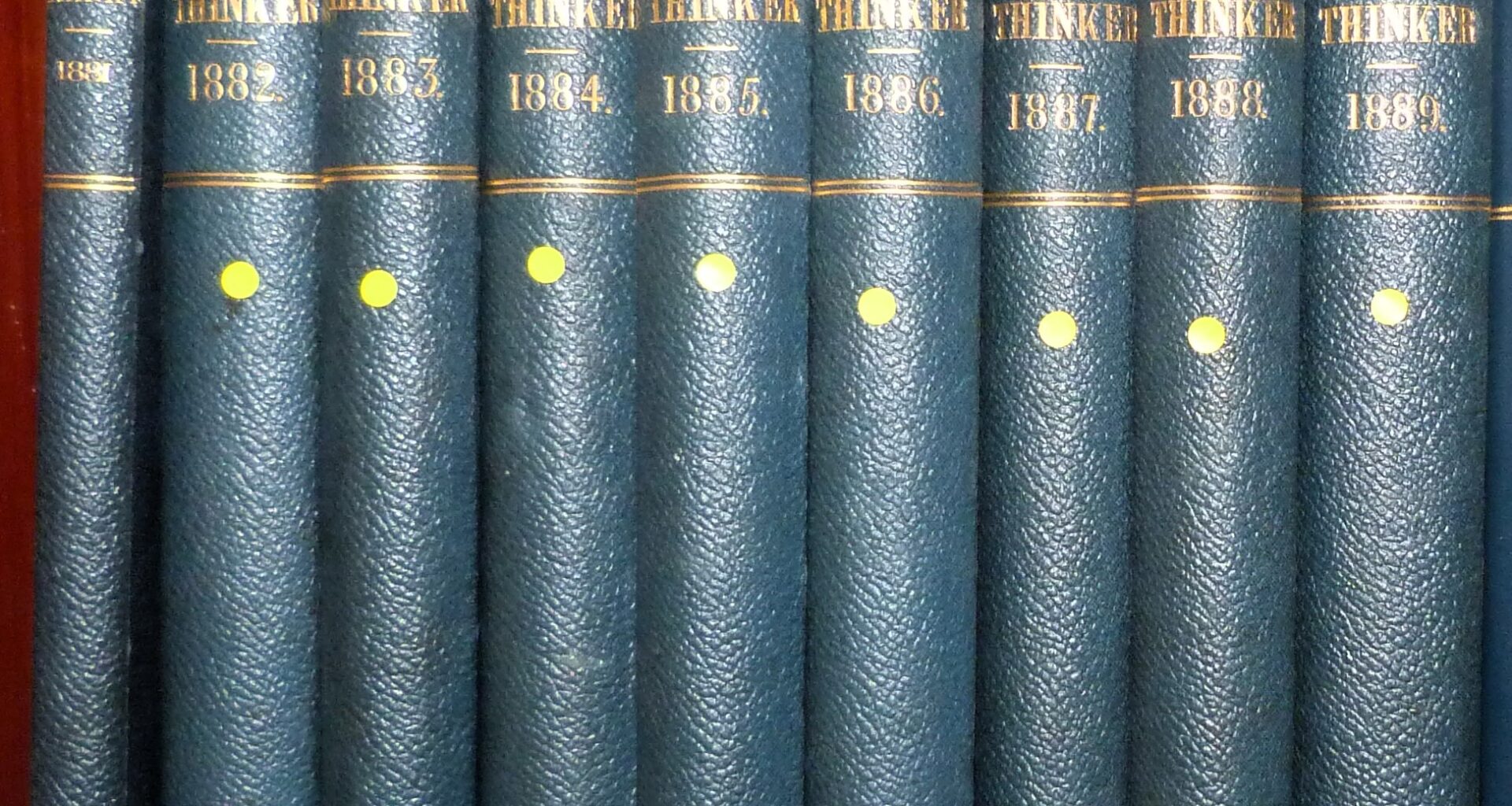
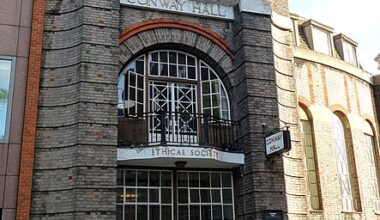


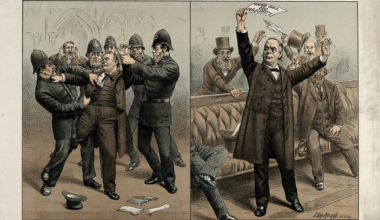


Your email address will not be published. Comments are subject to our Community Guidelines. Required fields are marked *
Donate